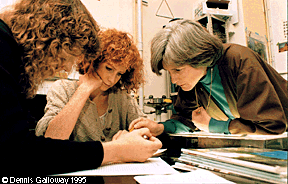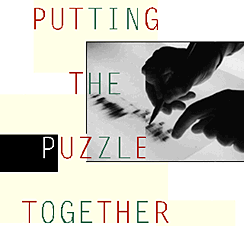

Now 50, King grew up in Wilmette, Ill., an upper middle class suburb of Chicago. She attended New Trier Township High School, regarded as one of the best public high schools in the country. She majored in mathematics at Carleton College in Minnesota, but modestly claims she was not a top student. "I was consistently a B math student," she says.
The chairman emeritus of Carleton's math department, John Dyer-Bennett, admits he didn't really remember King as a standout student until he refreshed his memory for introductory remarks he gave at a convocation in 1992, when she received an honorary doctorate from Carleton.

"You don't have to be a star as a student," she says. "It's more a matter of feeling your way. I just stuck with it. You do things well if you're motivated. I'll grant that I work very hard, and I believe work has a value in itself. Some years ago, my then-husband's family and I built a house from the ground up on a ranch in the Rockies. The important thing is learning how to do something and putting the puzzle together, whether it's building a house or finding a cure for cancer.
"To do science, you have to not be intimidated by failure, because you're always getting things wrong. Once in a blue moon, everything goes right. Blue moons are rare, but they're very important in science."
King joined the UW faculty in 1995, arriving in Seattle last summer and accepting a joint appointment as professor of medical genetics in the UW School of Medicine and professor of genetics in the College of Arts and Sciences. She was accompanied by 12 graduate students and post-doctoral fellows from her Berkeley lab, all supported by federal research grants or fellowships. Grants and fellowships also pay half of King's salary at the UW, and bring in an estimated $1 million in research funds.
"The move was harder than I anticipated, both personally and professionally, because I had 30 years of history at Berkeley," says King. "But it's been a very good decision."
At Berkeley, King's lab was the only one working in human genetics and the closest medical school was a long drive across the Bay to UC-San Francisco. At the UW, her School of Medicine colleagues are a stroll down the hall or up a flight of stairs.
"I had more people drop in at the lab in my first month here than in five years at Berkeley," she recalls. "There's a wonderful redundancy here: it's really a privileged situation to work here amid all this talent. You reach a critical mass, and the ideas ferment. Science is like a cauldron. You have to let the ideas gently bubble, and percolate to the surface."
While she's gratified to have access to the high-powered technological resources in the Health Sciences Center's new K-Wing, they were not the critical factors in her decision to move. "It's not just the hardware, it's imaginative ways of thinking," she says. "You become so comfortable where you are that you can't break out of the mold. I needed to think with fresh perspectives about biology. I needed clinical colleagues, not the isolation I worked in there. The UW is clearly among the best places to do this work."
A Eureka Moment ... Someday
The
Woman as Scientist